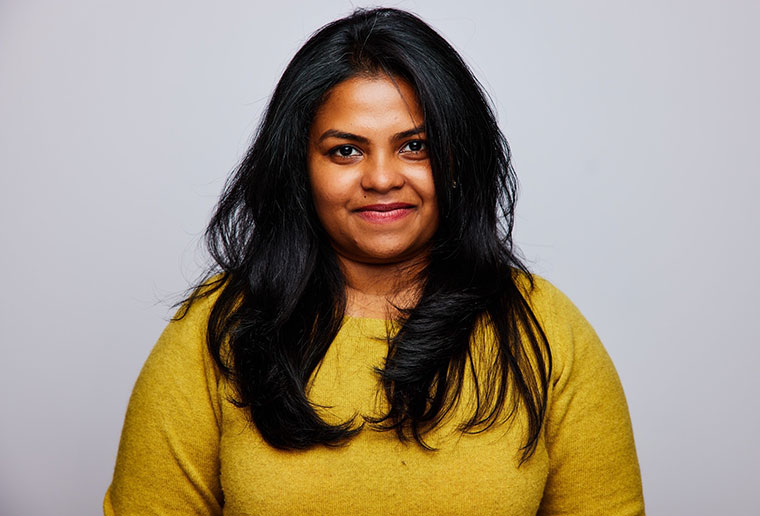
“As a new grad, if we had a difficult case and we did not know how to go about it, there was always someone who had some sort of experience with it or knew who to connect us with.”
The summer before her first year at Sarah Lawrence, Monisha Sebastin MS ‘18 worried she would feel out of place amongst her peers as an international student of color. “I could not have been more wrong about this,” she reflects. “[My classmates] were and to this day are my biggest support system. They made me feel like I have family here.” Monisha wants all international students to experience this same sense of belonging. Today, Monisha advocates for international students on the national level as a member of the International Society of Genetic Counselors. She is similarly known for her dedicated and compassionate approach to patient care as a Senior Genetic Counselor at Montefiore Medical Center. In 2022, the National Society of Genetic Counselors honored Monisha with the Heart of Genetic Counseling Award.
What does an advanced degree from Sarah Lawrence mean in the field of genomics?
Sarah Lawrence takes a lot of students compared to other programs, so the alumni network is huge. The program staff tend to keep in touch with the alumni, and that helps when it comes to the job searching process. We [also] have an alumni group where we can ask questions of our classmates and bounce ideas off of each other. As a new grad, if we had a difficult case and we didn’t know how to approach it, there was always someone who had some sort of experience with it or knew who to connect us with. And that was a huge benefit.
As someone who applied to Sarah Lawrence before the matching process was instituted, what made you accept your offer of admission?
With Sarah Lawrence, [the pedagogy is] more focused on the psychosocial aspects of genetic counseling. And that, I felt, was something I was lacking. My undergraduate degree is in Genetic Engineering and I’ve had extensive wet-lab research experience, so I wanted a program that would make me whole. Another criteria that I added at that time was, given the political climate, I wanted to be in a state where people of color and internationals were accepted and felt safe.
How would you advise international students weighing where/how to rank Sarah Lawrence?
I would say consider each program’s experience with having international students, what support they offer, and what their resources are. At Sarah Lawrence, they have a mentor/mentee system where they paired us up with a student from the year above us. My mentor was from a similar cultural background and continues to be one of my support systems. My mentee the following year was an international student, and I could guide her better given my experiences with cultural differences, acclimatization to the education system in the States, job search experience. It was mutually beneficial to have someone who can relate to and understand you easily. I don't know if a lot of programs do that.
[Additionally, at Sarah Lawrence,] we have one optional rotation that we can do anywhere. I wanted to test how genetic counseling is back home and to spend time with family, so I split my summer rotation, spending half the time in the U.S. at Cornell, another half back home. I had classmates who did rotations in the UK, in Australia, and in different parts of the world, so that's another advantage of Sarah Lawrence: the alumni network. If you find a rotation that you really want to do, [the program staff] will make it work.
How did the program prepare you for the work you are doing now?
[The guest lecture series] played a significant role in me choosing to work at Montefiore. Some of my coworkers were my lecturers. And as a person of color and as a minority, I knew they were people I would love to work with and are people who would stand up for me if I found myself in a situation involving racism or injustice.
Another aspect that Sarah Lawrence prepared me for was the different rotations they put me at. I got to see individuals from diverse backgrounds. And right now, I work in the Bronx where it's a hugely diverse cohort that I work with. And I feel like [because] I was exposed to individuals from different parts of the world, from different cultural backgrounds that it really helps me integrate and get accustomed to the cohort that I'm working with; much easier than what I would have had if I was only exposed to certain groups or ethnicities.
What advice would you give to students entering their first year of the program?
It’s important to speak up and ask for help when you need help, or if you think that you’re going to go into a particular specialty, communicate this. The clinical coordinators, at least at the time that I was a student, definitely listened to us. I think this is important advice from an international perspective, because, at least from where I am from, we are told, ‘You don't speak up, you don't ask, you don't make noise, you accept things as they are from your supervisors/faculty’. So it was good for me to know that you can ask and you can get what you are asking for or at least, they'll try to meet you somewhere in the middle.